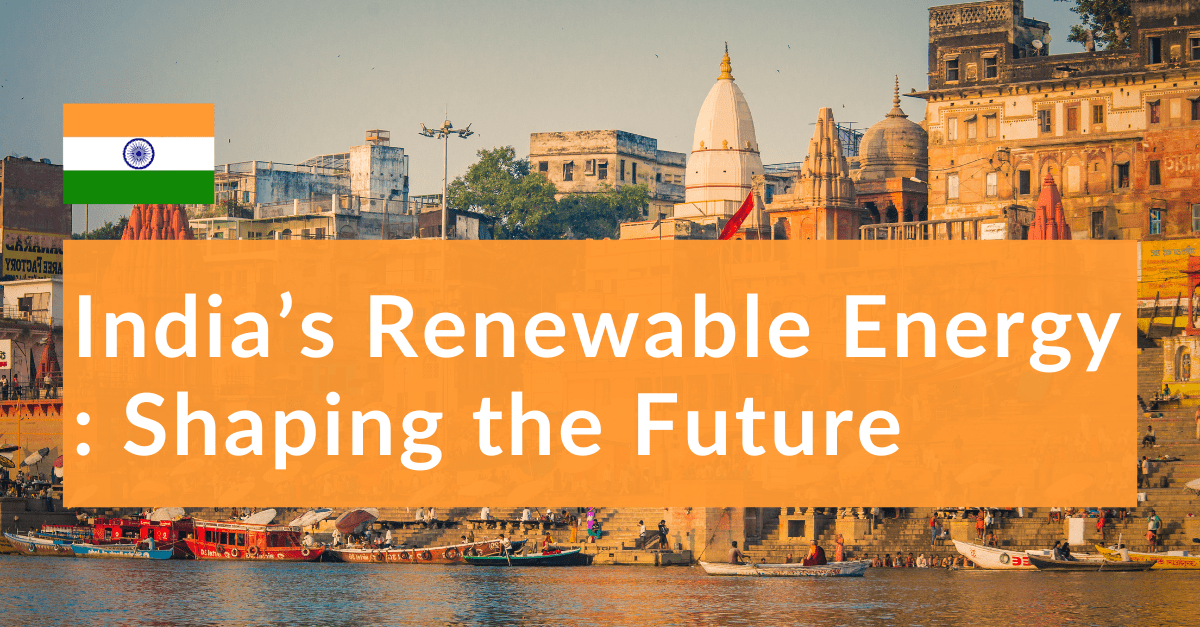Table of Contents
ToggleIndia’s Renewable Energy: Building a Sustainable Future
India is on a mission to transform its energy landscape, and renewable energy is playing a crucial role in this transition. In this blog, we will take a closer look at India’s current renewable energy capacity and the reasons why it is a potential market for renewable energy.
We will also examine investment trends, government policies, and key initiatives that are driving the growth of renewable energy in India. With projections showing that India could become one of the world’s largest markets for renewable energy, we will explore how the country plans to achieve its ambitious goals and whether it is on track for a sustainable future.
Join us as we dive into the fascinating world of renewable energy in India.
Table of Contents
Understanding India’s Current Renewable Energy Capacity
India is making significant progress in expanding its renewable energy capacity to reduce carbon emissions and promote sustainable power generation. With a target of achieving 500 gigawatts (GW) by 2030, the country is on track to become a global leader in green energy. The Indian government has implemented various policies and incentives to encourage the growth of renewable energy sources, such as solar power and hydroelectricity.
In June 2021, India surpassed 100 GW of installed capacity, and in February 2023, its total renewable energy capacity reached 122 gigawatts, excluding large hydro and nuclear plants. India has achieved its target of 40% installed energy from renewable sources by 2030, nine years ahead of schedule.
The Role of Solar and Wind Power
Solar power plays a crucial role in India’s renewable energy mix, with the country boasting one of the largest solar power capacities globally. Wind power is another significant contributor, especially in Tamil Nadu and Gujarat.
The share of renewable energy in India’s power generation capacity is increasing, led by solar and wind power. India has experienced rapid growth in installing solar modules and wind turbines, both of which have immense potential to drive the country’s energy transition and reduce carbon emissions.
Why is India a Potential Market for Renewable Energy?
India’s immense population and rising energy demand make it an appealing market for renewable energy. The country’s commitment to reducing greenhouse gas emissions and transitioning to clean energy presents investment opportunities.
With its expansive land area and geographic diversity, India has ideal conditions for harnessing solar and wind power. The government’s focus on promoting renewable energy further enhances India’s potential as a market.
Examining the Growing Demand for Renewable Energy
The growing demand for renewable energy in India can be attributed to various factors. Firstly, the need to reduce carbon emissions and combat climate change has prompted a shift towards cleaner and sustainable energy sources. Additionally, increasing electricity consumption has driven the demand for renewable energy solutions.
The declining costs of solar and wind power technologies have also made these options more affordable and accessible for industries, commercial establishments, and households. Furthermore, the Indian government’s support and favorable policies have played a crucial role in stimulating the demand for clean energy.
Investment Trends in India’s Renewable Energy Sector
India’s renewable energy sector has been a magnet for investments, both domestic and international. The country’s favorable financing options, tax incentives, and regulatory support have contributed to its appeal. Private sector participation has surged, with various companies investing in solar and wind power projects. International collaborations and partnerships have also played a crucial role in driving investments.
India’s renewable energy sector’s growth potential and investor-friendly climate make it an attractive choice for those seeking sustainable and profitable opportunities. With over US$ 12.57 billion in FDI since April 2000, the country has emerged as a key player in global renewable energy investments. Acquisitions accounted for 42% of investments in FY2021/22, with the Adani Group planning a substantial investment to become the world’s largest renewable energy producer.
Government Policies Supporting Renewable Energy Development
The Indian government has implemented a range of policies and initiatives to promote the development of renewable energy. To support green growth, the government has raised the renewable energy target to 175 GW by 2022, which is five times the current usage.
Notable schemes such as the National Solar Mission and Wind Energy Development Program have provided incentives and support for renewable energy projects. Additionally, the government has introduced central sector support for ISTS infrastructure for 13 GW renewable energy from Ladakh and dedicated the 600 MW Kameng Hydro Power Station in Arunachal Pradesh.
Policy reforms like competitive bidding and tariff regulations have created an environment conducive to renewable energy growth. The government’s focus on promoting emerging technologies, including green hydrogen, further strengthens its commitment to renewable energy development.
Renewable Energy Market Size in India
India’s renewable energy market is poised for significant growth as it stands as one of the largest in the world. With a projected CAGR of 13.7% from 2021 to 2026, the market encompasses various renewable energy sources such as solar, wind, hydro, and bioenergy.
The increasing share of renewable energy in India’s power sector reflects the growing market size. Additionally, investments in renewable energy infrastructure and technological advancements contribute significantly to the market’s expansion. With ambitious renewable energy targets, India is paving the way for a greener future.
Key Investments and Developments in India’s Renewable Energy Sector
India’s renewable energy sector has experienced significant investments and developments in recent years. Companies like Adani Green Energy and NTPC have made substantial investments in renewable power projects. States such as Rajasthan and Maharashtra have made remarkable progress in expanding their renewable energy capacity.
The Central Electricity Authority (CEA) plays a crucial role in planning and monitoring renewable energy projects in India. Additionally, India’s renewable energy sector has gained international recognition, attracting collaborations and partnerships from countries like Italy. These key investments and developments highlight the growing importance and potential of India’s renewable energy sector.
Government Initiatives to Promote Renewable Energy
The Indian government has implemented various initiatives to encourage the widespread adoption of renewable energy. These programs, such as the KUSUM scheme, incentivize farmers to install solar power systems for their agricultural needs. Additionally, dedicated agencies like the Indian Renewable Energy Development Agency (IREDA) have been established to facilitate investments in renewable energy.
The government provides incentives including generation-based incentives and tax benefits to promote renewable energy generation. Moreover, there is a focus on promoting rooftop solar installations and decentralized renewable energy systems. These government initiatives play a crucial role in supporting the growth and deployment of renewable energy in India.
Future Projections for Renewable Energy in India
India’s renewable energy capacity is projected to continue its rapid growth in the coming years. The country aims to achieve a renewable energy capacity of 450 GW by 2030, reducing its reliance on fossil fuels. The share of non-fossil capacity in India’s power generation mix is expected to increase, driving further growth in renewable energy.
With ongoing advancements in renewable energy technologies, India has the potential to become a global leader in sustainable power generation. This transition will contribute to India’s sustainable development goals and help mitigate climate change impacts.
Frequently Asked Questions
How do India’s renewable energy prospects and potential compare to those of other countries?
India’s renewable energy prospects and potential are impressive compared to other countries. As the world’s third-largest emitter of greenhouse gases, India recognizes the importance of sustainable development. With a target of achieving 450GW of renewable energy by 2030, India is one of the most ambitious nations in this field. Furthermore, its favorable geography and climate make it a prime location for solar and wind power.
Which states in India are leading in the use of renewable energy?
Rajasthan and Gujarat are at the forefront of renewable energy adoption in India, followed by Tamil Nadu, Karnataka, and Maharashtra. These states account for 70% of total green energy usage. Gujarat has the highest solar power capacity, while Tamil Nadu leads in wind power capacity.
Conclusion
India’s renewable energy sector is on a promising trajectory, driven by factors such as growing demand, favorable government policies, and significant investments. Solar and wind power have played a crucial role in India’s renewable energy capacity, contributing to the country’s sustainable energy goals. With the government setting ambitious targets for renewable energy development, it is evident that India is determined to achieve a sustainable and clean energy future.
As India’s renewable energy market continues to grow, businesses in the energy sector may face complex challenges related to compliance, employment, and project scalability. This is where Eos, with its expertise in Employer of Record (EoR) solutions, can provide invaluable support. Eos can assist businesses in navigating the intricacies of employing contractors, obtaining necessary licenses, and ensuring compliance in India’s dynamic renewable energy sector.
For businesses seeking to harness the potential of India’s renewable energy sector and overcome operational hurdles, Eos has a proven track record of supporting teams around the world. Contact us for a FREE consultation at inquiries@eosglobalexpansion.com to explore how Eos can facilitate your expansion and operations in India’s renewable energy landscape.







